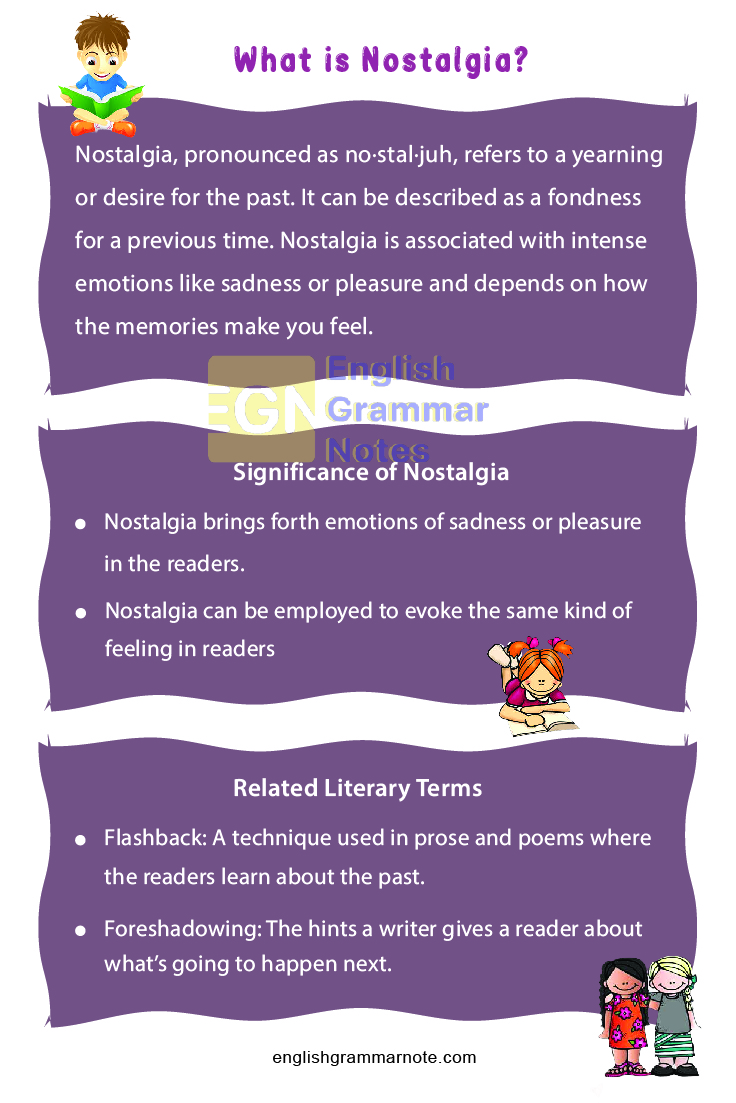The term nostalgia has its roots in the Homeric term, “nostos,” which implies homecoming. Homer made use of this term in his work Odyssey, to depict how homesick Odyssey felt when he freed himself from war. In this article, you will be introduced to all the essential information about nostalgia including its definition, examples, its significance, related terms, etc.
- What is Nostalgia?
- Nostalgia Meaning with Examples
- Significance of Nostalgia
- Related Literary Terms
- What is Nostalgia?
- What is the use of nostalgia in literature?
- Distinguish between nostalgia and flashback?
- Give some examples of sentences that make use of nostalgia?
What is Nostalgia?
Nostalgia, pronounced as no·stal·juh, refers to a yearning or desire for the past. It can be described as a fondness for a previous time. Nostalgia is associated with intense emotions like sadness or pleasure and depends on how the memories make you feel. In literature, nostalgia is employed to discuss an interest in the past.
Nostalgia Meaning with Examples
Given below are some examples of nostalgia found in everyday conversations:
- “Whenever I get the smell of wet soil, it takes me back to my childhood, when I used to wander in the field with my sister, who is now settled abroad.”
- “The day was too cold and I was reminded of the day I met my first love, and this event gives me a heightened sense of joy.”
- “Every time I hear this song, I am taken back to my college days when we used to listen to this song the whole day. Those days were priceless”
- “Yesterday when I saw the small kid playing on the ground with her friends, I was reminded of my own vacation with my cousins”
See More:
Significance of Nostalgia
The use of nostalgia in a literary work has various benefits:
- Nostalgia brings forth emotions of sadness or pleasure in the readers.
- Gives rise to memories of the past
- Nostalgia can be employed to evoke the same kind of feeling in readers
Related Literary Terms
Given below are some terms related to nostalgia.
- Flashback: A technique used in prose and poems where the readers learn about the past.
- Foreshadowing: The hints a writer gives a reader about what’s going to happen next.
- Imagery: Refers to the important sights, sounds, feelings, and smells in a work.
- Allusion: an indirect reference to an idea, event, or person.
- Frame Story: Refers to the presence of a narrative within a narrative.
- Initial Incident: An event that sets forth the story’s main plot.
Improve your English Grammar Skills and never make any mistakes in English concepts like parts of speech, tenses, English phrases, and a lot more by making the most of our English Grammar Notes.

FAQs on Nostalgia
Nostalgia refers to a yearning or desire for the past. It can be described as a fondness for a previous time.
2. What is the use of nostalgia in literature?
The use of nostalgia has various benefits. Nostalgia can bring about emotions of sadness and pleasure. Nostalgia also gives rise to memories of the past.
3. Distinguish between nostalgia and flashback?
Nostalgia refers to a yearning or desire for the past. It can be described as a fondness for a previous time. on the other hand, a flashback is a technique whereby the readers get to know about a character’s past life.
4. Give some examples of sentences that make use of nostalgia?
Examples that make use of Nostalgia include
- The day was too cold and I was reminded of the day I met my first love, and this event gives me a heightened sense of joy.”
- Yesterday when I saw the small kid playing on the ground with her friends, I was reminded of my own vacation with my cousins.
Conclusion
Nostalgia is used as a literary device that allows writers to discuss feelings of pain or pleasure associated with past events, places, or people. Feelings of nostalgia result in intense emotions which in turn act as a great way to attract the attention of your readers. Nostalgia is often employed in spoken language, specifically when people talk about events or things from their past and it includes a desire that they were back there once again.
